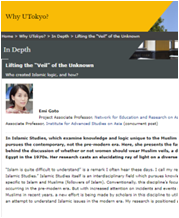
What is Islam?

✿ Navigator ✿
Emi Goto, Ph.D
Associate Professor, Network for Education and Research on Asia
Institute for Advanced Studies on Asia, The University of Tokyo, Japan
Research Theme: Understanding and Practice of Islam in the Contemporary World. Her recent interest is on the trend of division between “Muslims” and “Non-Muslims” which have been observed in various societies. In her view “halal industries” and “Burkini -debates” are examples of the trend.

Islam means submission to the will of God
The word “Islam” in Arabic means to submit oneself to God. Muslims (the believers of Islam, “a person who submits oneself to God”) believe that God created the world and governs the world, and He is the one and the only absolute existence. In the Arabian Peninsula in the seventh century, the words of God were said to be revealed to the people through the prophet Mohammed. Since then, those words of God have been kept intact in the form of a sacred text called “Quran.”
One Islam, many interpretations
What exactly does it mean to submit oneself to God? Currently, there are one billion or more Muslims around the world. They live in different areas, in various environments, with diverse ways of life. However, they share certain beliefs, and they take those very seriously. One of those is to believe in God and the prophets, to believe the Quran to be sacred and that it directly comes from God, and to believe that all people will be judged by God in the afterlife. However, due to differences in culture, society, individual ways of thinking, and the contexts that they live in, some variations can be seen in the beliefs about what God orders human beings to do and what God wants for human beings. One can also find differences in the beliefs and behavior of Muslims regarding proper clothing and diet or the ideal way of conducting one’s life.
The religion of Islam comes with diverse understandings and various practices
Such diversity and variation are a part of what Islam is. Unfortunately, in recent times, many people have the opposite understanding of Islam: very rigid claims about “what is Islam” and “who are Muslims” exist among Muslims and the non-Muslims. Those claims sometimes become a source of contention in the contemporary world. Halal, the topic we discuss here, is also subject to these misunderstandings.
Publications
Introduction
Lifting the “Veil” of the Unknown
Who created Islamic logic, and how?
Why Utokyo

